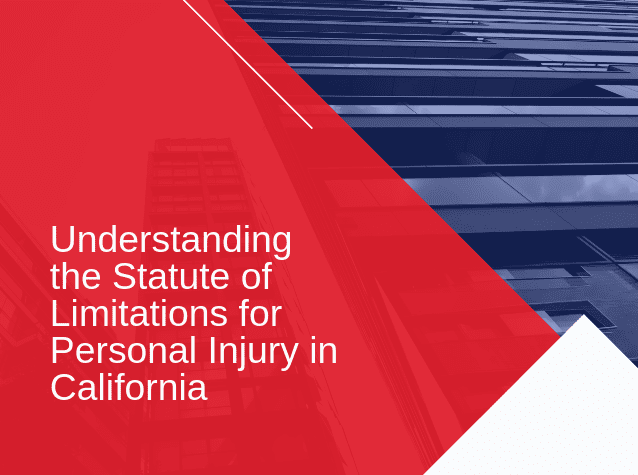
Most of us are at least familiar with the term “statute of limitations,” but when it comes to understanding it in the context of a personal injury, there are hidden details and complexities to be aware of because they can drastically affect your ability to file a claim.
The Statute of Limitations in California is defined as “the deadline for filing a lawsuit.” You must make a claim for your losses within that timeframe or risk losing any legal right to compensation. The Statute of Limitation varies from one type of claim to the next. For personal injury, you have two years from the date of the injury to file a claim in the State of California.
Personal injury can be anything from events where the other party had ill intentions, such as assault, battery, or emotional abuse, to accidents where there was no intent to harm, such as car crashes and injuries that happen in the workplace.
While two years is the standard amount of time to file claims against such injuries, there are exceptions — and in certain cases you have more or less time. Here are a few scenarios worth getting familiar with so you understand how much time you really have to file a claim.
Cases Against the Government
If the at-fault party is the government, you have six months from the time of the injury to file what’s called an “administrative claim.” This is a claim you file with the appropriate government office or agency before you file in court. The six-month timeframe only applies to the administrative claim, for which you’ll need to download and fill out government forms.
Delayed Discovery of Injury
As mentioned above, the Statute of Limitations in the State of California is two years from the date of your injury. However, not every injury is apparent immediately following an event. For example, injuries from automobile accidents can take weeks and sometimes months to surface and cause the victim discomfort.
In such cases, the “delayed discovery” rule applies. Here, you have one year from the time you discovered — or reasonably should have discovered — your injury to file a claim.
When the Statute of Limitations Is Tolled
In some cases, the Statute of Limitation is “tolled” — that is, the time limit for filing a claim stops running. This applies to cases where the defendant is a minor, out of the state, in prison, or legally insane. In these situations, the statute stops counting down until the person’s situation ends, whether that means they turn 18 years of age, return to the state, are released from prison, or are deemed to have their mental state of mind restored.
Whether or not the other party had intent to harm, you are entitled to compensation any time an injury occurs. While you should always try to file a claim as soon as the injury occurs, major injuries are one of life’s unexpected challenges, and not everyone is able to deal with the paperwork and processes that go along with filing a claim right away. It helps to know beforehand your rights around this process in the event of a delay.
Once you know the basics, you should always seek a reputable lawyer who can further help you navigate this complex system and receive the compensation you deserve for you and your family’s peace of mind. Rodriguez & Associates has a long history of helping clients through personal injury claims. If you or a loved one has been injured, reach out today to start a conversation. We have a personal injury law office in Bakersfield and help personal injury victims throughout the state.
